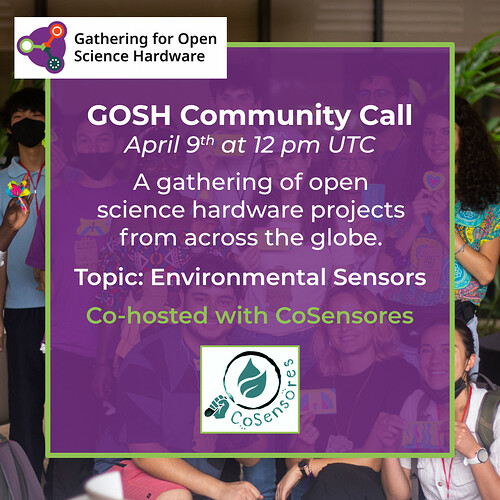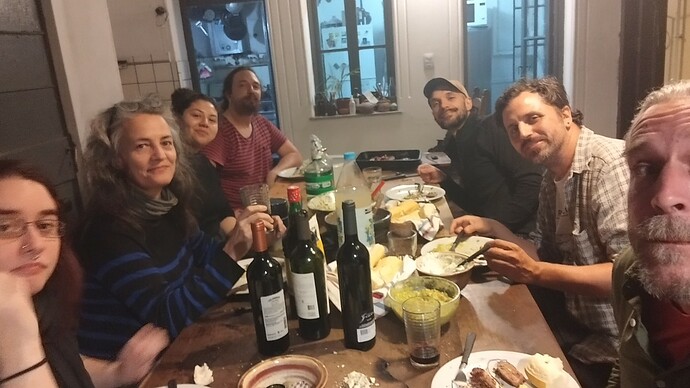Dear GOSH Community,
We are excited to announce the speakers for our upcoming GOSH Community Call on Environmental Sensors, happening on April 9th at 12 pm UTC. We’ve got a fantastic lineup of presenters from CoSensores, Caminos de Agua, Hacking Ecology, Laboratorio Agroecológico, and the University of Texas at Austin. Find out more about the speakers below!
Register for the call here.
Fernando “Nano” Castro – Laboratorio Agroecológico Abierto/reGOSH
Professor and researcher at the Faculty of Agricultural Sciences (UN Cuyo). Nano works at the interface between scientific/technological communities and local communities that need to improve their production practices or monitor their environment. He has facilitated numerous open scientific tools workshops in Chile and Argentina. He is currently working alongside the Latin American community reGOSH to develop and establish an Open Agroecological Laboratory.
Juan Pedro Maestre – University of Texas at Austin
Dr. Maestre (Juan P. M.) is an environmental scientist and Research Scientist at the University of Texas at Austin, dedicated to the research of air (and water) quality. This presentation will focus on an open source device, the Beacon, used to measure air quality.
Aaron Krupp – Caminos de Agua
Caminos de Agua is a non-profit organization registered in the U.S., as well as a civil association in Mexico (A.C.). with a mission to improve human health and community well-being through adequate and affordable access to clean water We work collaboratively with local communities, leading research institutions, and other diverse stakeholders to innovate and implement water solutions that result in adequate access to clean and safe drinking water sources in the region where we work: the northern part of the state of Guanajuato, in central Mexico. Aaron Krupp (former coordinator of research and technology at Caminos de Agua) will present a project that they have been working on since 2018 in collaboration with IO Rodeo and a group of researchers at the University of Liverpool to develop an open source and low-cost system for the measurement of arsenic in water samples. The presentation will focus on the achievements to date (system testing, software, and hardware development, collaborations with various student groups) and look to the future (an accessible guide on how to make your own arsenic measurement, maybe a measurement kit!).
Saulo Jacques – Hacking Ecology
Hacking Ecology is a group of ecologists, technologists, and environmental advocates who build high-precision, fair-priced systems for environmental monitoring. Nayad is an accessible and flexible open hardware for environmental monitoring integrated into an automated auditing platform that verifies the veracity and quality of the data collected. Social media profiles: Twitter, Mastodon, Instagram, Gitlab
Lara Jatar and Kevin Poveda Ducón – Grupo de Sensores Comunitarios (CoSensores)
CoSensores is a group of professors, researchers, and students from different national universities in Argentina. Since 2013, they have been working on the development and fine-tuning of freely accessible tools and technologies for the monitoring of environmental variables, mainly linked to water quality, through participatory survey strategies with communities that are immersed in environmental conflicts. The group has created a microalgae-based bioassay adapted to be implemented in the field with organized communities immersed in environmental conflicts, mainly related to water contamination by agrochemicals as a result of the expansion of the agro-industrial frontier, which was developed and fine-tuned. More recently, within the framework of the work of doctoral fellows and researchers from the CoSensores group, in connection with the Laboratory of Integrated Processes of Environmental Analysis and Remediation and the PhD in Environmental Sciences of the Institute of Environmental Research and Engineering (IIIA) of the National University of San Martín (UNSAM), the development and validation in the laboratory and in the field of open-source scientific tools to measure variables of interest has been deepened such as conductivity, pH, dissolved oxygen, turbidity and various nutrients (nitrate, phosphate, etc.) using colorimetric and nephelometric techniques with a low-cost colorimeter.

